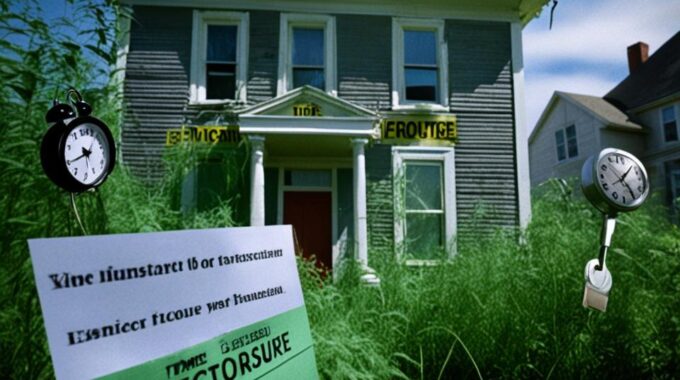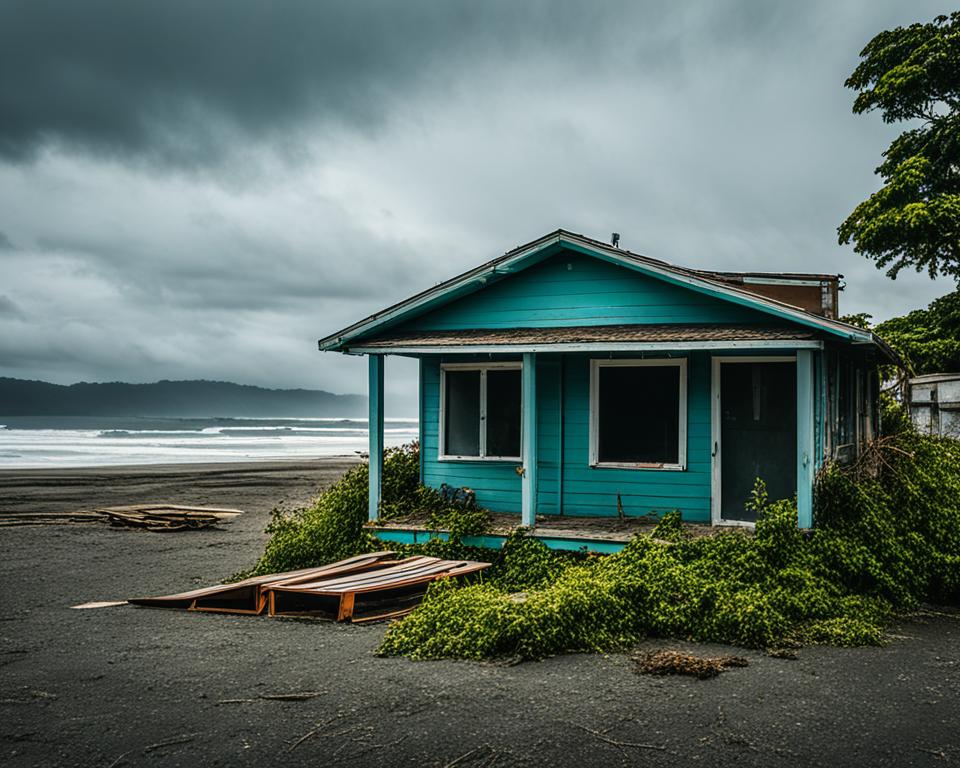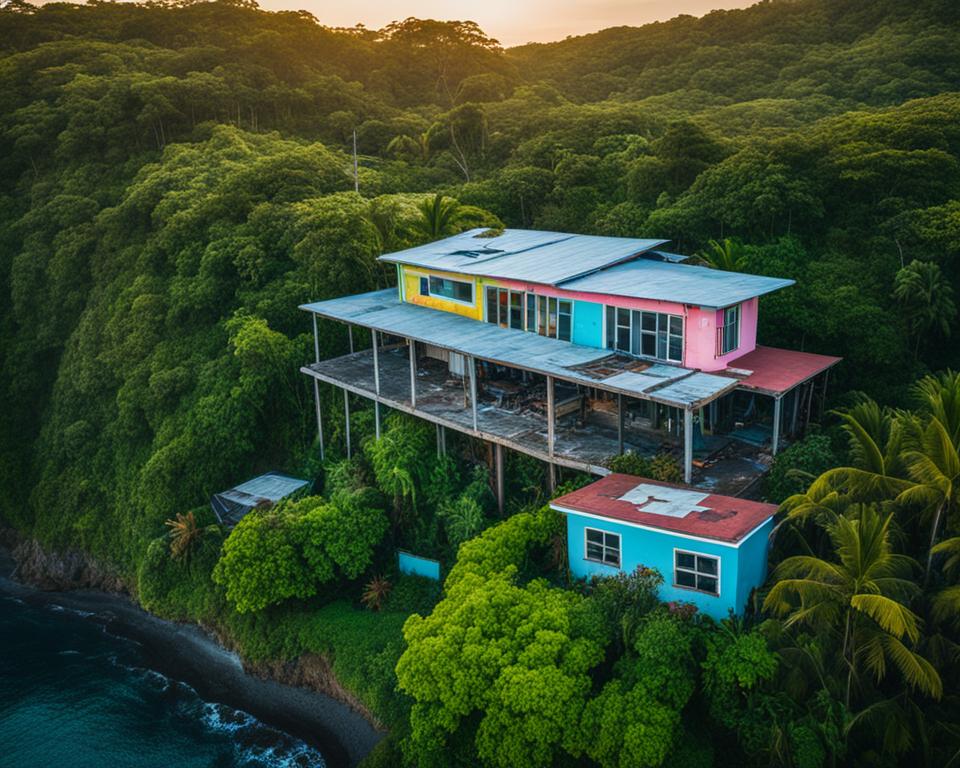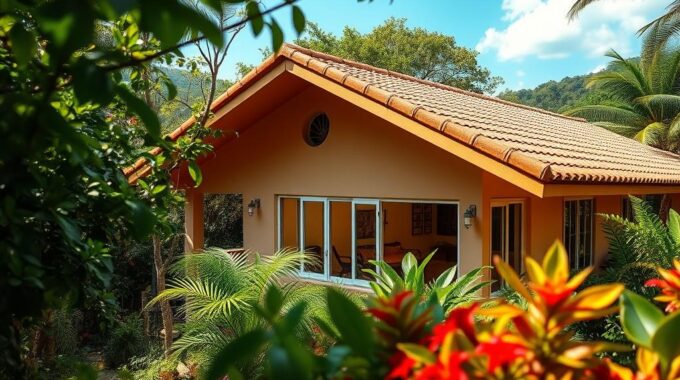Considering hard money loans in Costa Rica? Learn about the disadvantages, including high interest rates and strict terms, to make an informed decision.

What Happens in a Foreclosure in Costa Rica – A Comprehensive Guide With Gapequityloans.com
Are you thinking about what happens if there’s a foreclosure in Costa Rica? It can be scary to face the chance of losing your home. But, with the right info and help, you can manage this tough time. You might even be able to avoid foreclosure. Let’s look into the details of the foreclosure process in Costa Rica. We’ll discuss the legal side, your rights, and ways to protect your home and peaceful life.
Key Takeaways
- Understanding the foreclosure laws and process in Costa Rica is crucial to protecting your rights and exploring alternative solutions.
- Early communication with your lender can open the door to loan modification options and repayment plans, potentially preventing foreclosure.
- Utilizing home equity and exploring alternative financing solutions, such as Gap Equity Loans, can provide a viable path to avoid losing your property.
- Seeking professional advice and staying organized with your financial records can empower you to make informed decisions and access available assistance programs.
- Exploring alternatives like short sales and deeds in lieu of foreclosure can help minimize the impact on your credit and financial future.
Understanding Foreclosure in Costa Rica
In Costa Rica, foreclosure is a big deal that affects homeowners a lot. If a borrower can’t pay their mortgage loan, the lender might start the foreclosure process. This means they can take the house and sell it. Homeowners could lose their house and damage their credit.
What is Foreclosure?
Foreclosure happens in Costa Rica when a lender takes a home because the owner can’t pay the loan. If homeowners miss too many mortgage payments, the lender can sell or keep the house to settle the loan.
The Impact of Foreclosure
Foreclosure is more than losing your home in Costa Rica. It can really hurt your credit. This makes it tough to get loans later. It also causes a lot of stress and worry for families. It’s important for homeowners to know about foreclosure and how to avoid it.

Communication with Your Lender
If you’re struggling to pay your mortgage in Costa Rica, you could face foreclosure. This process can cause you to lose your home and damage your credit. However, there are steps to avoid this and protect your investment. The first is talking to your lender if you’re in mortgage trouble. They might help you find a solution to keep your house. Early talks with your lender can open up ways to avoid foreclosure.
Importance of Early Communication
Being open with your lender early on is crucial. It might help you prevent losing your home. Early talks can bring about better solutions, such as changing your loan or selling the property.
Exploring Loan Modification Options
Modifying your loan could be a great step. Your lender might make the terms easier. They could extend the loan’s life or reduce interest. This change helps in managing your bills, preventing economic stress.
Negotiating Repayment Plans
Another option is working out a repayment plan. This could involve smaller payments over time. Open discussion with your lender is important. It’s a proactive step that can help in avoiding home loss.

Strategies to Avoid Foreclosure in Costa Rica
Using your home’s equity is smart to avoid foreclosure in Costa Rica. With a home equity loan, you access your home’s value. This money can pay off the mortgage, stopping missed payments. It’s great if you have a lot of built-up equity.
Gap Equity Loans: A Viable Solution
In Costa Rica, stopping foreclosure can be hard. Yet, Gap Equity Loans offers a way out. It’s simple and works well for homeowners. They look at your home’s value to offer a loan of up to 45% to 50%. This connects your loan directly to your home’s value. Thus, you clearly see your loan options.
Loan-to-Value Ratio (LTV)
Gap Equity Loans start at $50,000 and go to the millions. This aids homeowners in areas like the central valley and beaches. Loans help avoid losing your home and suit various financial needs.
Loan Range and Lending Areas
Gap Equity Loans offer rates from 12% to 16% annually, below typical banks. They provide up to three years for repayment. It helps many homeowners manage their loans and avoid foreclosure in Costa Rica.
Competitive Rates and Flexible Terms
Gap Equity Loans’ private mortgage lenders go up to 50% LTV. They have a large network of investors, mainly retirees from North America or Europe. They prefer safe, on-time interest payments.

| Loan Features | Gap Equity Loans | Traditional Banks |
|---|---|---|
| Loan-to-Value (LTV) Ratio | Up to 50% | Typically lower |
| Loan Approval Time | 5-10 business days | 6-12 months |
| Interest Rates | 12% to 16% | Around 14.23% |
| Loan Amounts | $50,000 to $1,000,000+ | Varies |
| Loan Terms | 6 to 36 months | Typically longer |
What Happens in a Foreclosure in Costa Rica
In Costa Rica, knowing how foreclosure works is crucial. The country’s foreclosure laws help both sides. If you might face foreclosure, acting early and using foreclosure prevention strategies is important. They can reduce the risk and stress of losing your home.
Understanding Costa Rican Foreclosure Laws
Understanding your legal rights is key if foreclosure is a possibility. In Costa Rica, laws about real estate and property are very important. Learning about foreclosure laws in Costa Rica can help you protect your home.
Homeowners’ Legal Rights and Protections
If you have a home in Costa Rica, you’re not alone. There are legal rights and protections for homeowners facing foreclosure. Knowing these foreclosure legal protections can be impactful. They might help you stop foreclosure or reduce its impact.
Foreclosure Prevention Tips
Acting early is crucial to prevent home loss in Costa Rica. Start by talking to your lenders. Also, consider private money loans like those from Gap Equity Loans. They offer quick solutions and flexible plans.
Seeking Professional Advice
We work to keep homes safe in Costa Rica. Our goal is to provide fast fund access with clear rules. We want to help you make the best choices for your situation.
Staying Organized and Keeping Records
Keeping good financial and communication records is essential. It means you know your options and can talk to lenders effectively. Being organized and understanding your financial situation can prevent foreclosure in Costa Rica.
Exploring Assistance Programs
Costa Rica offers several programs to help homeowners in danger of foreclosure. Local housing counselors, government support, and non-profits can assist. They focus on stopping foreclosure and reducing debt. They help you by working with lenders and providing financial support.

Alternatives to Foreclosure
Got real estate trouble in Costa Rica? We’re here to help. There are smart moves to make to dodge foreclosure. For instance, using your home equity is a good idea. Gap Investments offers loans from $50,000 to over $1,000,000 USD. These loans stretch from 6 months to 3 years, catering to different financial situations. They can help you stay away from foreclosure in Costa Rica.
Short Sale
Thinking of selling under what you owe? That’s a short sale. It’s a path to avoid foreclosure and bankruptcy in Costa Rica. A real estate agent can make things smoother. They’ll guide you through foreclosure rescue options Costa Rica. This might soften the blow on your credit.
Deed in Lieu of Foreclosure
Giving your property deed back is a deed in lieu of foreclosure. In exchange, the mortgage debt is often forgiven. It’s a way to bypass the troubles of distressed property Costa Rica and mortgage delinquency solutions Costa Rica.

Conclusion
Our journey shows how to avoid losing your home in Costa Rica. Talking with your lender early is key. This can lead to better choices like changing the loan or selling the property.
Knowing all your choices is important. Once you understand the foreclosure process and your rights, you can act wisely. With quick action and the right help, you can protect your home and money in Costa Rica’s real estate scene.
It’s crucial to be proactive, keep things organized, and look at all options. You might use your home equity or discuss things with your lender. Or you could consider different paths like a short sale.
FAQ
What is foreclosure in Costa Rica?
Foreclosure in Costa Rica happens when a borrower fails to pay back a loan. The lender takes back the property. This can lead to the loss of your home and damage your credit greatly.
What are the consequences of foreclosure in Costa Rica?
Foreclosure can have a big financial and emotional impact. It lowers your credit score, making it hard to get new credit or loans. It also leads to a lot of stress for families and individuals.
What should I do if I’m struggling to pay my mortgage in Costa Rica?
If paying your mortgage is becoming difficult, reach out to your lender. They might help by offering a loan modification or a repayment plan. This could allow you to keep your house.
How can I use my home’s equity to avoid foreclosure in Costa Rica?
Using your home’s equity can be a wise tactic to avoid foreclosure in Costa Rica. A home equity loan allows you to use your home’s value to pay off the mortgage. This way, you prevent missing payments.
What is Gap Equity Loans and how can it help with foreclosure in Costa Rica?
Gap Equity Loans aim to aid homeowners in Costa Rica to evade foreclosure. They offer loans based on your home’s value. With flexible terms and good rates, you can better manage your mortgage.
What are my legal rights and protections as a homeowner facing foreclosure in Costa Rica?
In Costa Rica, real estate laws and property rights offer key protections to homeowners in foreclosure. Knowing your legal rights is important. It can help you prevent foreclosure or reduce its impact.
What are some foreclosure alternatives in Costa Rica?
A short sale is one option. This is where you sell for less than you owe. Another is a deed in lieu of foreclosure. Here, you give the property back to the lender to cancel your debt.
Source Links
- https://www.gapequityloans.com/en/avoid-foreclosure-in-costa-rica/
- https://www.gapequityloans.com/en/strategies-to-avoid-a-foreclosure-in-costa-rica/
- https://gapinvestments.com/en/not-to-lose-your-home-to-foreclosure/
- https://gapinvestments.com/en/how-to-avoid-foreclosure-in-costa-rica/
- https://crlaw.info/info/real-estate/mortgages/mortgages-and-financing-in-costa-rica/
- https://www.remax-oceansurf-cr.com/are-there-foreclosed-homes-costa-rica-sale
- https://www.livingcostarica.com/costa-rica-real-estate-topics/how-to-buy-foreclosed-property-in-costa-rica/
- https://www.gapequityloans.com/en/costa-rica-home-equity-loans/
- https://www.gapequityloans.com/en/costa-rica-home-equity-loans-guide/
- https://www.gapequityloans.com/en/equity-loans-faq/
- https://www.gapequityloans.com/en/loan-application-costa-rica/
- https://gapinvestments.com/en/secure-loans-in-costa-rica/
- https://www.gapequityloans.com/en/commercial-loans/
- https://www.gapequityloans.com/en/construction-loans/
Article by Glenn Tellier (Founder of CRIE and Grupo Gap)



